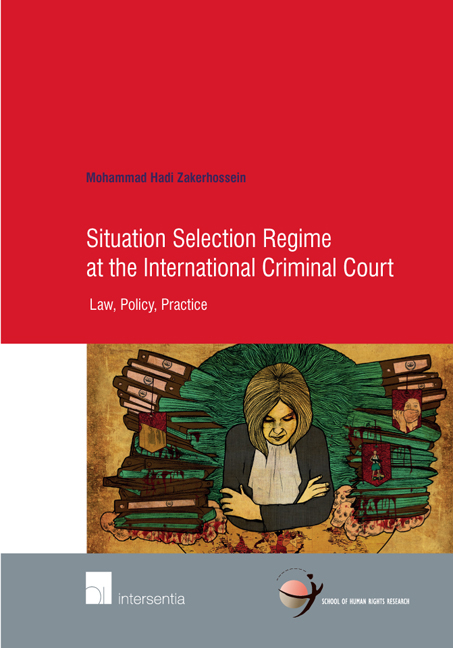Book contents
- Frontmatter
- Contents
- Acknowledgment
- Abbreviations
- General Introduction
- Part One Formulating the Concept of Situation in the Rome Statute Sense
- Part two Situation Selection Process
- Part three Situation Selection Criteria
- Part Four Situation Selection In Light Of Expressivism
- Conclusion
- Bibliography
- ICC Case Tables
- OTP Documents
- About the Author
- School of Human Rights Research Series
General Introduction
Published online by Cambridge University Press: 13 October 2018
- Frontmatter
- Contents
- Acknowledgment
- Abbreviations
- General Introduction
- Part One Formulating the Concept of Situation in the Rome Statute Sense
- Part two Situation Selection Process
- Part three Situation Selection Criteria
- Part Four Situation Selection In Light Of Expressivism
- Conclusion
- Bibliography
- ICC Case Tables
- OTP Documents
- About the Author
- School of Human Rights Research Series
Summary
CONTEXTUALIZATION OF THE PROBLEM
In late 2016, the International Criminal Court (ICC, Court) faced a legitimacy crisis: a series of withdrawals by some African States from the Rome Statute surged. These States declared their intentions to terminate their memberships of the ICC. The relationship between the Court and Africa has been fragile over recent years. Calls for mass withdrawals from the Rome Statute were first made by the African Union's Open-Ended Ministerial Committee of Ministers for Foreign Affairs on the ICC. The Committee was established pursuant to the decision of the African Union Assembly during its 25th Ordinary Session, which was held in Johannesburg, South Africa in June 2015. The Open-Ended Committee is composed of Ethiopia, Chad, Burundi, Eritrea, South Sudan, Kenya, Libya, Sudan, Madagascar, Namibia, Zimbabwe and Senegal. In April 2016, the Committee called for the African States Parties to the ICC to collectively withdraw from the Rome Statute, provided that the African demands would not be met. African States had demanded, inter alia, recognition for immunity of sitting Heads of State. Two African Presidents have been targeted by the Court, Al Bashir (Sudan) and Kenyatta (Kenya). The Committee first tried to meet the United Nations Security Council (UNSC) to find a solution. However, this effort was not successful. Consequently, Burundi, Gambia and South Africa announced their decisions to leave the ICC. On 12 October 2016, the Parliament of the Republic of Burundi voted to support a plan to withdraw its country from the Rome Statute. Later, Burundi informed the United Nations Secretary-General (UNSG) of its intention to leave the ICC. On 21 October 2016, South Africa announced that it had notified the UNSG that it was withdrawing from the ICC. Later, Gambia joined this course of withdrawals.
The Fifteenth Session of the ICC Assembly of States Parties (ASP) that was held in November 2016 was considerably affected by the African countries’ initiative against the Court. At the time, as the director of a Non-Governmental Organization, I had participated in the Session. I was witnessing how the regular topics in the Session were overshadowed by the African States’ decisions. Universality has been one of the core aims of the ICC.
- Type
- Chapter
- Information
- Situation Selection Regime at the International Criminal CourtLaw, Policy, Practice, pp. 1 - 22Publisher: IntersentiaPrint publication year: 2017

